4.6- Classical Theatre
18th Century Theater
[audio:theatreoverview.mp3]“Although the 18th century produced few great playwrights and witnessed no great technological advances in the theater, it was by no means a stagnant period. The most fundamental change was in the nature of its audience. Theater ceased to be stylized court entertainment or knockabout peasant fun and became more concerned with the lives of its new, middle-class audience. It was more politically aware, and more realistic.’
Neil Grant — History of Theatre 2002 Sterling Publishing Co. , London
France
[audio:theateroffrance.mp3]- Paris only had one theater
- Plays from the Baroque era were performed
- Plays that imitated the great Baroque era works were performed
- Melodrama
- Comedy of manners
Important playwrights spoke out for social reform
England
[audio:liscensedtheatre.mp3]London only had 2 officially sanctioned theater
- Unlicensed theater broke new ground, but were opposed by city government
- Inventive ways of staging plays
- Plays free of charge
- Cover costs through refreshment sales
- Government Censorship!!!
- Curb “licentiousness’
- Fear of the power of staged political satire
- A Vision of The Golden Rump
- Did it really exist?
Actors and Actresses became more acceptable in society
David Garrick 1717-79 – British
[audio:davidgarrick.mp3]- Got his start in one of the unlicensed theater outside of London
- An innovator in creating realism
Opera was still very popular [audio:beggarsopera.mp3]
Italian Opera very popular
Ballad Opera — a new genre — developed in England
Optional video clips
Beggar’s Opera by John Gay – Satirical lyrics set to popular tunes
a theatrical version
a classic film version
Germany
[audio:germany.mp3]- Germany was broken into 350 (give or take) separate states
- Last quarter of the century – the birth of Sturm and Drang (storm and stress)
- The Court at Weimar was noted for its amateur theater production
- In 1784 a new theater was built with a professional troupe in residence
- This theater attracted the greatest playwrights of the region
The Playwrights
France
Voltaire 1694-1778
The pen name for François-Marie Arouet (French spelling)
The French literary landscape was dominated by Voltaire in the 18th Century
- An outspoken writer calling for social reform
- His writings were philosophical and witty
- Criticized the king and the church
- Jailed twice, and in constant fear of being jailed his entire life
- Due to censorship, his writing was banned
- Every time his writing was banned — more people bought it
- A millionaire at 40
- Traveled to England in exile — met important literary figures
- A playwright — his most important theatrical work — Oedipe (please consult spelling)
Pierre Beaumarchais 1732-99
- Le Barbier de Seville
- Le Mariage de Figaro
- The Marriage of Figaro was seen as an attack on the aristocracy. Both plays were not performed for 3 years after they were accepted by the playhouse
- Both these plays became the basis for librettos of famous operas
- Mozart — The Marriage of Figaro
- Verdi — The Barber of Seville
Germany
Friedrich von Shiller 1759-1805
- Evolved the Strum und Drang style into a more “thoughtful and beautiful’ plays
- Friend of Goethe
- Wrote: among other plays
- Maria Stuart — about Mary Queen of Scots
- Wilhelm Tell — about the Swiss national hero
- Beethoven set Schiller poem Ode to Joy in the final movement of his 9th Symphony
Johann Wolfgang von Goethe 1749-1832
- First success РG̦tz von Berlichingen
- Based on the story of a medieval robber baron
- Sturm und Drang style
- Written in Shakespearean tradition
- Huge cast of extras and lots of scene changes
- Faust – best known work
- Based on a legend, which had already been brought to the stage by Christopher Marlowe
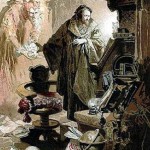
- 1926 German silent film version – full length


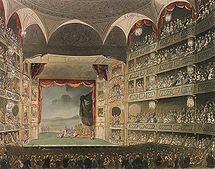
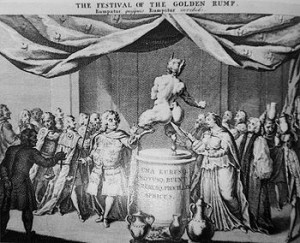
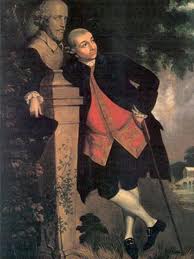
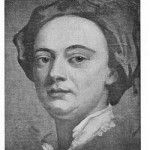
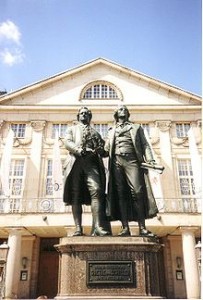

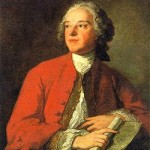

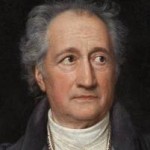
 |
|
No. 1 — March 3rd, 2013 at 11:19 pm
[…] Classical theatre. April 24th, 2009. Web. 3 March 2013. https://amtf200.community.uaf.edu/2009/04/24/05-theater-3/ […]
No. 2 — October 18th, 2013 at 6:46 pm
[…] https://amtf200.community.uaf.edu/2009/04/24/05-theater-3/ […]
No. 3 — October 19th, 2013 at 9:41 pm
[…] https://amtf200.community.uaf.edu/2009/04/24/05-theater-3/ […]